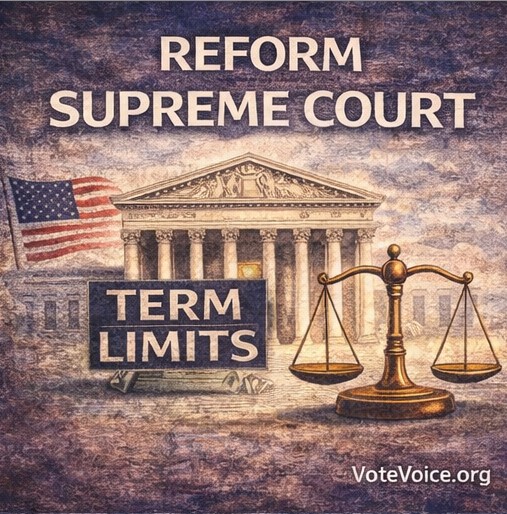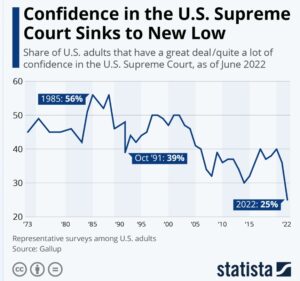Supreme Court Reform

Core Ideas:

First, public confidence in the Court is near a historic low. When citizens lose faith in the impartiality of their highest judicial body, the entire justice system loses legitimacy.
Second, lifetime tenure has created a system without accountability. Justices can serve 30, 40, or even 50 years, long after the America that appointed them has transformed. There’s no mechanism for addressing ethical lapses, no requirement for transparency, and no recourse when justices refuse to recuse themselves from cases where they have clear conflicts of interest.
Third, the appointment process has become a bare-knuckle political blood sport. Each vacancy triggers a national crisis, with billions spent on lobbying and partisan warfare, because everyone knows: whoever controls these seats controls American law for generations.
Fourth, nine unelected individuals now wield disproportionate influence over national policy: overturning laws passed by Congress, reversing precedents that stood for decades, and effectively legislating from the bench on issues that should be decided democratically.
And fifth, the Court operates with virtually no ethical oversight. While every other federal judge must follow a binding code of conduct, Supreme Court justices have resisted meaningful ethics requirements, operating under voluntary guidelines they can essentially ignore.
Introduction:
Nine individuals, appointed for life, holding more power over your daily existence than almost any elected official you’ll ever vote for. They decide whether you have access to healthcare, what rights you can exercise, how your vote counts, and what protections you’re guaranteed under the law.
Yet unlike every other judge in America, they answer to no code of ethics. Unlike any other public servant, they serve until they choose to retire or die. And unlike the officials you elect, you have little say in who they are.
This is the reality of the United States Supreme Court. And it’s time we had an honest conversation about why that’s a problem—and what we can do about it.
Below is Project RAD’s plan for US Supreme Court Reform
📘Make the Supreme Court Unbiased and Politically Independent
🎯 Objective:
Ensure that the Supreme Court acts as a politically independent check on the other branches of government.
✅ Key Actions:
A Mandatory Code of Ethics – Ensure the Supreme Court adheres to the same professional standards as other judges and public officials.
Impose 18-year Term Limits and Scheduled Rotations – Promote judicial independence while preventing lifetime entrenchment and political gamesmanship.
Increase Transparency and Public Access –Enhance public understanding and trust in the Court’s decisions and operations.
Reinforce Judicial Independence and Neutrality- Protect the Court from external political pressures and ensure impartiality.
Reform Appointment and Confirmation Processes – Depoliticize the process of selecting and confirming justices.
TAKE ACTION – Contact Congress
(How to contact Congress) click here
Congressional Committees That Oversee The Supreme Court
Senate Committee on the Judiciary
-
The principal Senate committee for oversight of the Supreme Court.
-
Responsibilities include:
-
Confirmation hearings for Supreme Court nominees
-
Legislation related to the federal judiciary
-
Oversight of judicial ethics, conduct, and administrative practices
-
🔑 Most visible during Supreme Court confirmation hearings, but also involved in judicial ethics and court reform proposals.
House Committee on the Judiciary
The primary committee overseeing the federal judiciary, including the Supreme Court.
-
Jurisdiction includes:
-
Federal courts and judicial proceedings
-
Judicial ethics and conduct
-
Impeachment of federal judges (including Supreme Court Justices)
-
Legislation affecting the structure or operation of the judiciary
-
🔑 This committee handles hearings or legislation related to Supreme Court ethics, jurisdiction, or structure.


